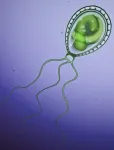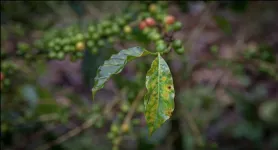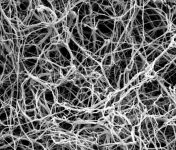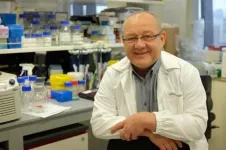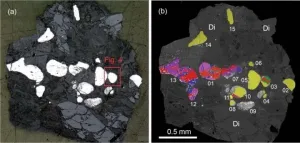Maternal diets rich in Omega-3 fatty acids may protect offspring from breast cancer
2021-06-28
(Press-News.org) HUNTINGTON, W.Va. - According to researchers at Marshall University, a maternal diet rich in Omega-3 fatty acids protects from breast cancer development in offspring. In a new study recently published by Frontiers in Cell and Developmental Biology, researchers noted a significant difference in mice from mothers that were fed a diet rich in canola oil, compared with mothers fed a diet rich in corn oil. A maternal Omega 3-rich diet affected genome-wide epigenetic landscape changes in offspring and potentially modulated gene expression patterns.
Dr. Ata Abbas, a former postdoctoral research fellow in Marshall's Department of Biological Sciences, headed a research team under the leadership of Dr. Philippe Georgel in the College of Science. Research was done in the Cell Differentiation and Development Center at Marshall as part of a collaborative effort with the Joan C. Edwards School of Medicine's Department of Biochemistry and Microbiology, under the leadership of Dr. W. Elaine Hardman.
Researchers noticed a three-week delay in mortality in mice whose mothers were fed canola oil versus corn oil. The early delay in mortality was significantly different, but the ultimate overall survival rate was not. Eventually, all the mice developed tumors, but the ones fed canola oil had tumors that were slower-growing and smaller than the mice fed corn oil. Translated to human time scale, the duration of the protective effect linked to the maternal diet would be equivalent to several months (Sengupta et al., 2016).
This study is among a body of work done by Marshall University scientists and others looking at the link between Omega-3 fatty acids and reduced incidence of various types of cancer including, but not restricted to, Chronic Lymphocytic Leukemia and Diffuse Large B-Cell Lymphoma.
"The issue of parental diet and inter-generational transmission has become an important field of research; however, the mode of action often remains partially elusive," said Georgel, a professor in the Department of Biological Sciences at Marshall. "The MU research group focused on 'epigenetic' aspects of trans-generational transmission to explain the reported role of Omega-3 fatty acids. Epigenetics involves changes in gene expression which are not linked to changes in genetic sequences. These results have the potential to promote the design of simple changes in diet which would allow for reduced onset of various types of cancer, not only for the individuals using that diet but also for their offspring."
INFORMATION:
The study was conducted with funding from the Department of Defense Health Program and the National Institutes of Health.
ELSE PRESS RELEASES FROM THIS DATE:
2021-06-28
New Brunswick, N.J. (June 28, 2021) - A Rutgers-led study sheds new light on the evolution of photosynthesis in plants and algae, which could help to improve crop production.
The paper appears in the journal New Phytologist.
The scientists reviewed research on the photosynthetic amoeba Paulinella, which is a model to explore a fundamental question about eukaryote evolution: why was there a single origin of algae and plants? That is, why did photosynthesis by primary plastid endosymbiosis not originate multiple times in the tree of life?
Photosynthesis is the process by which plants and other organisms use sunlight to synthesize ...
2021-06-28
A first-of-its-kind longitudinal study of infant curiosity found that months-old babies most captivated by magic tricks became the most curious toddlers, suggesting a pre-verbal baby's level of interest in surprising aspects of the world remains constant over time and could predict their future cognitive ability.
"Something about a baby's curiosity about magic tricks is predicting how curious they become as preschoolers," said Lisa Feigenson, co-director of the Johns Hopkins University Laboratory for Child Development. "What the data suggest is that some three-year-olds have a leg up or seem particularly well positioned to learn a lot about the world."
The findings appear today in Proceedings of the National Academy of Sciences.
Until this study, little was known about curiosity ...
2021-06-28
New Brunswick, N.J. (June 28, 2021) - COVID-19's socio-economic effects will likely cause another severe production crisis in the coffee industry, according to a Rutgers University-led study.
The study, which appears in the journal Proceedings of the National Academy of Sciences, included researchers from the University of Arizona, University of Hawaii at Hilo, CIRAD, Santa Clara University, Purdue University West Lafayette and University of Exeter.
"Any major impacts in the global coffee industry will have serious implications for millions of people across the globe, including the coffee retail ...
2021-06-28
An Australian mammal thought to have been wiped out over 150 years ago can now be crossed off our list of extinct animals, following a new study.
Researchers compared DNA samples fromeight extinct Australian rodents, as well as 42 of their living relatives, to look at the decline of native species since the arrival of Europeans in Australia.
The study showed the extinctGould's mouse was indistinguishable from the Shark Bay mouse, still found on several small islands off the coast of Western Australia.
According to lead author Dr Emily Roycroft ...
2021-06-28
Scientists have made a breakthrough in understanding the process that leads to a blood clot forming in the lungs - a condition that kills more than two thousand people in the UK each year.
The clot forms a pulmonary embolism or blockage, cutting off blood flow to major blood vessels in the lungs.
In many cases, the blockage is caused by fragments that have broken away from a blood clot elsewhere in the body, such as a deep vein thrombosis in one of the legs. The fragments are transported to the lungs via the blood stream.
In a paper published today (28 June) in the scientific ...
2021-06-28
The billions of microbes living in your gut could play a key role in supporting the formation of new nerve cells in the adult brain, with the potential to possibly prevent memory loss in old age and help to repair and renew nerve cells after injury, an international research team spanning Singapore, UK, Australia, Canada, US, and Sweden has discovered.
The international investigating team led by Principal Investigator Professor Sven Pettersson, National Neuroscience Institute of Singapore, and Visiting Professor at Lee Kong Chian School of Medicine, Nanyang Technological University, Singapore (NTU Singapore), and Sunway University, Malaysia, found that gut microbes that metabolise tryptophan - an essential amino acid - secrete small molecules called ...
2021-06-28
Researchers from Tallinn University of Technology, Grete Raba, Signe Adamberg, and Kaarel Adamberg showed that an acidic environment enhances the production of butyric acid from apple pectin by faecal bacterial consortia - microbiota. Pectin is a dietary fibre abundant in apples, berries, fruits, and vegetables. Pectin is used in jellies and desserts. As human digestive enzymes are not able to degrade pectin, it is metabolized by the microbes of the large intestine. The main conclusions of the research, published in FEMS Microbiology Letters, was the importance of environmental acidity (pH) on the composition and metabolism of colon bacteria. The colonic pH is, however, strongly related to one's diet.
Fibre-rich diets that contain plenty of whole-grain ...
2021-06-28
A connective tissue protein known to support the framework of organs also encourages immune responses that fight bacterial infections, while restraining responses that can be deadly in the condition called sepsis, a new study finds.
Led by researchers from NYU Grossman School of Medicine, the work revolves around the extracellular matrix (ECM) of connective tissues, once thought of as an inert framework that shapes bodily compartments, but increasingly recognized as a signaling partner with nearby cells in normal function, and a contributor to disease when signals go awry. Among the key players in the ECM are fibroblasts, the cells that make tough structural matrix proteins ...
2021-06-28
WASHINGTON, June 28, 2021 -- Ancient Rome's emperors did some pretty bizarre stuff -- bursting into uncontrollable fits of laughter, appointing a horse as a priest, dressing in animal skins and attacking people ... the list goes on. Why were they acting that way? Well, it might have been lead poisoning. In this week's episode, we unwrap the possibility that lead caused the Roman Empire's collapse: https://youtu.be/4k7CvSiomlA.
INFORMATION:
Reactions is a video series produced by the American Chemical Society and PBS Digital Studios. Subscribe to Reactions at http://bit.ly/ACSReactions and follow us on Twitter @ACSReactions.
The American Chemical Society (ACS) is ...
2021-06-28
Allabogdanite was first reported in the early 2000s from the Onello - a small iron meteorite recovered from the gold placer at the Bolshoi Dolguchan River in Eastern Yakutia. Chemically, the mineral belongs to phosphides - the compounds containing phosphorus in a negative oxidation state. It was named in honour of the crystallographer Alla Bogdanova. Since that, allabogdanite was identified in several iron meteorites. The recent discovery at the Dead Sea is the first confirmation of the mineral on Earth. Allabogdanite was detected in the course of a systematic study of terrestrial phosphides from the Dead Sea region.
'Our research included the experiments on phase transitions of terrestrial allabogdanite at high pressure and high temperature at the DESY synchrotron ...
LAST 30 PRESS RELEASES:
[Press-News.org] Maternal diets rich in Omega-3 fatty acids may protect offspring from breast cancer
